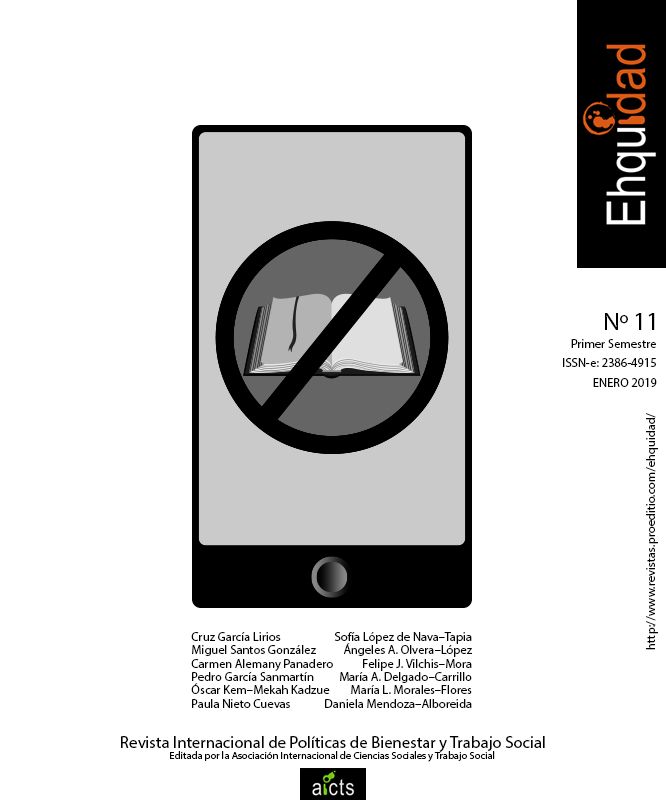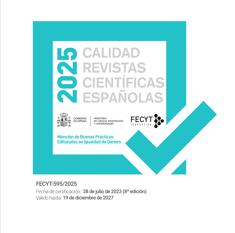The evaluation of the social intervention. Theoretical approaches
DOI:
https://doi.org/10.15257/ehquidad.2019.0003Keywords:
Assessment, Impact, Intervention, Social, TheoryAbstract
Faced with the necessity and the growing interest in order to have a theoretical and methodological basis with the aim of carrying out the evaluation and the valuation of the social interventions by the scientific community, we are trying to collect and synthesize the different theoretical approaches in this study. Although, inevitably, this evaluation can only come from rigorous research, which derives from the systematic application of the scientific method due to both limitations of the classical and quantitative evaluation and weaknesses of the qualitative evaluation, a passionate debate has been generated. Thus, we find approaches which understand the evaluation as a value judgment, synonymous with valuation or more restrictive viewpoints like the classical and experimental evaluation. Other theoretical approaches have as priority different elements: knowledge and information, management, beneficiaries or policy. Nowadays and concluding the debate generated, it is detected a tendency to a theoretical and methodological approach which is integrating, pragmatic and adapted, and where some key elements for the practice of the evaluation highlight, such as, process, valuation, causal relationship, internal and external validity, effectiveness and efficiency, decision-making, policy-making and interventions. All of them have the same purpose: solving social problems.
Downloads
References
Abramson, M., & Wholey, J. (1981). Organization and management of the evaluation function in a multilevel organization. New Directions for Evaluation, 1981(10), 31-48.
Achúcarro, C., & Guillén, C. (1996). Aspectos históricos, teóricos y metodológicos de la evaluación de programas. . In Intervención psicosocial: elementos de programación y evaluación socialmente eficaces, 56-89.
Aguilar, M., & Ander-Egg, E. (1994). Evaluación de servicios y programas sociales. Buenos Aires: Lemen.
Alkin, M., & Christie, C. (2005). Unraveling theorists' evaluation reality. Directions for Evaluation, 2005(106)., 111-128.
Alkin, M., Patton, M., & Weiss, C. (1990). Debates on evaluation. Newbury Park: Sage.
Alvira, F. (1991). Metodología de la evaluación de programas. Madrid: CIS Centro de Investigaciones Sociológicas.
Anguera, M., & Chacón, S. (2008). Aproximación conceptual en evaluación de programas. En M. T. Anguera, S. Chacón, & A. Blanco-Villaseñor, Evaluación de programas sanitarios y sociales. Abordaje metodológico (págs. 17-36). Madrid: Síntesis.
Ballart, X. (1992). ¿Cómo evaluar programas y servicios públicos? Aproximación sistemática y estudios de caso. Madrid: INAP.
Ballart, X. (1996). Modelos teóricos para la práctica de evaluación de programas. En Brugué, Q. y Subirats, J., Lecturas de gestión pública (págs. 321-351). Madrid: INAP. Obtenido de http://scioteca.caf.com/bitstream/handle/123456789/1008/Version%20Web%20Evaluacion%20de%20politicas%20.pdf?sequence=1&isAllowed=y
Berk, R., Lenihan, K., & Rossi, P. (1981). Crime and Poverty: Some Experimental Evidence from Ex-Offenders. En H. E. Freeman, & M. A. Solomon, Evaluation studies review annual, 6. (págs. 339-359). Beverly Hills, CA.: Sage.
Bickman, L., & Rog, D. (2008). The Sage handbook of applied social research methods. Thousand Oaks, CA: Sage.
Bingham, R., & Felbinger, C. (2002). Evaluation in practice: A methodological approach. New York: Chatham House Publishers.
Borus, M., & Tash, W. (1970). Measuring the Impact of Manpower Programs: A Primer. Ann Arbor, Michigan: The University of Michigan-Wayne State University, Institute of Labor and Industrial Relations.
Bouzas, R. (2005). Los caminos de la evaluación de políticas públicas: una revisión del enfoque. Revista de investigaciones políticas y sociológicas, 2, 69-86.
Browne, A., & Wildavsky, A. (1987). What should evaluation mean to implementation. The politics of program evaluation, 15, 146.
Bryk, A. S. (1983). Stakeholder Based Evaluation. San Francisco: Jossey-Bass.
Bueno, C., & Osuna, J. (2012). La evaluación de políticas públicas en las ciencias sociales: entre el ser y el deber ser. Prisma Social: revista de investigación social, 9, 176-208.
Bustelo, M. (1999). Diferencias entre evaluación e investigación: una distinción necesaria para la identidad de la evaluación de programas. Revista Española de Desarrollo y Cooperación, 4, 9-29.
Campbell, D., & Boruch, R. (1975). Making the case for randomized assignment to treatments by considering the alternatives: Six ways in which quasi-experimental evaluations in compensatory education tend to underestimate effects. En C. A. Bennett, & A. A. Lumsdaine, Evaluation and experiment: Some critical issues in assessing social programs (págs. 195-296). New York: Academic Press.
Campbell, D., & Stanley, J. (1963). Experimental and Quasi-Experimental Designs for Research. Chicago: Rand McNally.
Cohen, E., & Franco, R. (1992). Evaluación de proyectos sociales. México: Siglo XXI.
Cousins, J., & Whitmore, E. (1998). Framing participatory evaluation. New directions for evaluation, 80, 5-23.
Crane, J. A. (1988). Evaluation as Scientific Research. Evaluation Review, 12(5), 467-482.
Cronbach, L., & Shapiro, K. (1982). Designing evaluations of educational and social programs. San Francisco: Jossey-Bass.
Cronbach, L., & Snow, R. (1977). Aptitudes and instructional methods: A handbook for research on interactions. New York: Irvington.
Chelimsky, E. (2006). The purposes of evaluation in a democratic society. Handbook of evaluation: policies, programs and practices. Obtenido de https://search-proquest-com.ezproxy.uned.es/docview/36662947?accountid=14609om.ezproxy.uned.es/docview/36662947?accountid=14609
Chen, H., & Rossi, P. (1980). The multi-goal, theory-driven approach to evaluation: A model linking basic and applied social science. Social Forces, 59. Obtenido de https://search-proquest-com.ezproxy.uned.es/docview/38276265?accountid=14609
Chen, H.-T. (1990). Theory-driven evaluation. Newbury Park, CA: Sage.
De la Orden, A. (1990). Evaluación de los efectos de los programas de intervención. Revista de investigación educativa, 8(16), 61-76.
De Miguel, M. (2000). La evaluación de programas sociales: fundamentos y enfoques teóricos. Revista de Investigación Educativa, 18(2), 289-217.
Dunn, W. N. (1994). Public Policy Analysis. New Jersey: Prentice Hall.
Eisner, E. W. (1985). The art of educational evaluation: A personal view. London: Taylor & Francis.
Fernández-Ballesteros, R. (1992). El proceso como procedimiento científico y sus variantes. Introducción a la evaluación psicológica, 1.
Fernández-Ballesteros, R. (1996). Evaluación de programas: una guía práctica en ámbitos sociales, educativos y de salud. Madrid: Síntesis.
Fetterman, D. M. (1998). Ethnography. Thousand Oaks: Sage.
Freeman, H., & Solomon, M. (1981). Evaluation Studies Review Annual. Beverly Hills: Sage.
Fullan, M. (2005). Leadership and sustainability: System thinkers in action. Thousand Oaks: Corwin Press.
Guba, E., & Lincoln, Y. (1981). Effective evaluation: Improving the usefulness of evaluation results through responsive and naturalistic approaches. San Francisco: Jossey-Bass.
Hendricks, M. (1981). Service delivery assessment: Qualitative evaluations at the cabinet level. New Directions for Evaluation, 1981(12), 5-24.
Hernández, M. (2002). Evaluación del desempeño de las organizaciones públicas a través de la calidad. VII Congreso Internacional del CLAD sobre la Reforma del Estado y de la Administración Pública. Lisboa.
Hogwood, B., & Gunn, L. (1984). Policy analysis for the real world. Oxford: Oxford University Press.
Horst, P., Nay, J. N., Scanlon, J. W., & Wholey, J. S. (1974). Program management and the federal evaluator. Public Adminjstration Review, 34(4), 300-308.
House, E. R. (1980). Evaluating with Validity. Beverly Hills, CA: Sage.
Johnson, J., & Joslyn, R. (1995). Political Science Research Methods. Washington, DC: Congressional Quarterly.
Kelly, R. M. (1998). An inclusive democratic polity, representative bureaucracies, and the new public management. Public administration review, 58(3), 201-208.
King, J., Morris, L., & Fitz-Gibbon, C. (1987). How to assess program implementation. Thousand Oaks: Sage.
Langbein, L., & Felbinger, C. (2006). Public program evaluation: a statistical guide. New York: M. E. Sharpe.
Lincoln, Y., & Guba, E. (1985). Naturalistic Inquiry. Beverly Hills, CA: Sage.
Lipsey, M., & Pollard, J. (1989). Driving toward theory in program evaluation: More models to choose from. Evaluation and Program Planning, 12(4), 317-328.
Madaus, G., Stufflebeam, D., & Scriven, M. (1983). Program evaluation. Evaluation models, 3-22.
Majone, G. (1989). Evidence, argument and persuasion in the policy process. New Haven, CN: Yale University Press.
Martínez-Mediano, C. (1998). La teoría de la evaluación de programas. Educación XX1, 1. doi:http://dx.doi.org/10.5944/educxx1.1.1.398
Monnier, E. (1995). Evaluación de la acción de los poderes públicos. Nadrid: Instituto de Estudios Fiscales. Ministerio de Economía y Hacienda.
Nioche, J. P. (1982). De l'évaluation à l'analyse des politiques publiques. Revue française de science politique, 32(1), 32-61.
Owen, J., & Rogers, P. (1999). Program Evaluation: Forms and Approaches. Thousand Oaks: Sage.
Palumbo, D. J. (1987). The politics of program evaluation. Newbury Park, CA: Sage.
Parlett, M., & Hamilton, D. (1972). Evaluation as illumination: A new approach to the study of innovatory programs. Occasional paper, 9, 55-73.
Patton, M. Q. (1990). Qualitative evaluation and research methods. Newbury Park, CA: Sage.
Pichardo, A. (1993). Evaluación del impacto social: el valor de lo humano ante la crisis y el ajuste. Buenos Aires: Lumen-Hvmanitas.
Pollit, C. (1995). Justification by works or by faith? Evaluating the new public management. Evaluation, 1(2), 133-154.
Preskill, H., & Catsambas, T. (2006). Reframing evaluation through appreciative inquiry. London: Sage.
Prottas, J. (1979). People-Processing: The Street-Level Bureaucrat in Public Service Bureaucracies. Lexington, MA: Lexington Press.
Provus, M. M. (1969). The Discrepancy Evaluation Model, An Approach to Local Program Improvement and Development. Washington, DC: Bureau of Research, Office of Education.
Riecken, H., & Boruch, R. (1974). Social experimentation: a method for planning and evaluating social intervention. New York: Academic Press.
Rossi, P., & Freeman, H. (1985). Evaluation: A Systematic Approach. Beverly Hills: Sage.
Rossi, P., & Lyall, K. (1978). An overview evaluation of the NIT experiment. En M. Cook, K. Del Rosario, K. Henningan, M. Mark, & W. Trochim, Evaluation studies review annual, 3 (págs. 412-428). Beverly Hills, CA: Sage.
Rossi, P., & Wright, S. (1977). Evaluation research: An assessment of theory, practice, and politics. Evaluation Quarterly, 1(1), 5-52.
Scriven, M. (1967). The Methodology of Evaluation. En R. Tyler, R. Gagne, & M. Scriven, Perspective of Curriculum Evaluation. Vol 1 (págs. 39-83). Chicago: Rand McNally.
Scriven, M. (1973). Goal-Free Evaluation. En E. R. House, School Evaluation. The Politics and Process (págs. 319-328). Berkeley, CA: Mc Cutehan.
Scriven, M. (1991). Evaluation thesaurus. Newbury Park, CA: Sage.
Shadish, W., & Reichardt, C. (1987). The intellectual foundations of social program evaluation: The development of evaluation theory. Evaluation studies review annual, 12, 13-29.
Shadish, W., Cook, T., & Leviton, L. (1991). Foundations of program evaluation: Theories of practice. Newbury Park, CA: Sage.
Shortell, S., & Richardson, W. (1978). Evaluation designs. Health program evaluation. St Louis: Mosby.
SIEMPRO. Gestión Integral de Programas Sociales Orientada a Resultados. (1999). Manual Metodológico para la Planificación y Evaluación de Programas Sociales. Brasil: UNESCO, Fondo de Cultura Económica.
Smith, E., & Tyler, R. (1942). Appraising and recording student progress. Oxford: Harper.
Smith, N., & Brandon, P. (2008). Fundamental issues in evaluation. New York NY: Guilford Press.
Stake, R. (2004). Standards-based and responsive evaluation. Thousand Oaks, CA: Sage.
Stake, R., & Easley, J. (1978). Case Studies in Science Education. Evaluation Report Series, Vol I.
Stake, R., & Gjerde, C. (1975). An Evaluation of TCITY: The Twin City Institute for Talented Youth. Evaluation Report Series, 7.
Stufflebeam, D., & Schiklield, A. (1987). Evaluación Sistemática. Guía teórica y práctica. Madrid: Paidós/MEC.
Suchman, E. A. (1968). Evaluation research: Principies and practice in public service and social action programs. New York: Russell Sage Foundation.
Tyler, R. W. (1986). Changing Concepts of Educational Evaluation. International Journal of Educational Research, 10(1). doi:https://doi.org/10.1016/0883-0355(86)90008-X
Weiss, C. (1972). Evaluation research. Englewood Cliffs, NJ: Prentice-Hall.
Weiss, C. H. (1975). Investigación evaluativa: Métodos para determinar la eficiencia de los programas en acción. México: Trillas.
Weiss, C. H. (1998). Methods for studying programs and policies. London: Prentice Hall.
Weiss, C., & Bukuvalas, M. (1980). Social science research and decision-making. New York: Columbia University Press.
Weiss, R., & Rein, M. (1970). The evaluation of broad-aim programs:
Experimental design, its difficulties, and an alternative. Administrative Science Quarterly, 15(1), 97-109.
Wholey, J. S. (1979). Evaluation: Promise and Performance. Washington, DC: Urban Institute.
Wholey, J. S. (1983). Evaluation and Effective Public Management. Boston: Urban Institute.
Wholey, J.S.; Abramson, M. A. y Bellavita, C. (1986). Performance and credibility: developing excellence in public and nonprofit organizations. Lexington, MA: Lexington.
Wolf, R. M. (1979). Evaluation in education: Foundations of competency assessment and program review. New York: Pagers Publishers.












